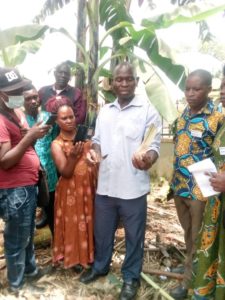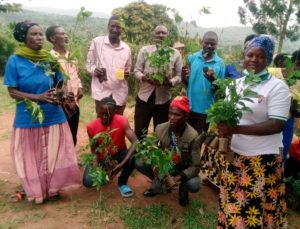For a healthier, better future for families, schools and communities
Most people in Africa today are not as healthy as their grandparents were, and they do not expect to live as long as they did. This is a shocking situation. It is not only due to diseases such as malaria and HIV/AIDS. It is also due to bad nutrition, lack of exercise, air and water pollution – and COVID and the climate crisis.
Discover was formed in 2014 and has worked with a network of partners in Ghana, Kenya, Malawi, Uganda and Zimbabwe.

These seminars will continue. Click here for more information.
Up to March 2022, our focus was on training in the following topics:
- organic farming and the cultivation of drought-resistant vegetables, indigenous trees and medicinal plants,
- hygiene, nutrition and the treatment of common health complaints with home-made natural medicines,
- income generating projects,
- conflict resolution, and
- what our partners advise can best help their communities – this has also led us to support, for example, the construction of fuel efficient stoves, rainwater collection tanks and fishponds.
We are thrilled with the way that some communities have been transformed. Health has improved through improved nutrition, hygiene, good organic gardening and treatment of common (and sometimes serious) ailments with locally prepared natural medicines.
Our focus is now changing – to growing trees. From October 2020 to March 2022 we conducted an „Exit strategy“ to enable our partners to become more self-reliant so that they can continue their excellent work without further outside support.
For the next five years, we aim to support the growing of 30,000 trees per year. This includes the care of those trees to ensure a good rate of survival. Growing trees is a very practical response to the climate crisis, and helps communities in many ways similar to our previous work, for example in improving agricultural output, nutrition and food security, and providing herbal medicines and scope for income generation, e.g. honey.
Trees

- enable rainwater to soak into the ground, and therefore
- help to prevent flooding and soil erosion,
- provide shade and maintain a cool environment,
- improve soil fertility,
- provide fruits, medicines and timber,
- clean the air, and
- sequester carbon.
Growing indigenous trees helps to protect the biodiversity of insects, birds and animals.
Growing trees brings the community together. Children and adults learn the importance of trees for surviving the climate crisis.

There are three important, emerging strands of our tree growing work.
1. Work with schools
Where teachers and pupils work together in planting and caring for trees, the next generation is learning how crucial trees are for their survival.
2. Agroforestry
In Agroforestry, trees and vegetables are grown together, so from one piece of land there is a double harvest.
The trees provide shade and a good microclimate for the vegetables.
3. Natural regeneration
When an area is fenced, shoots appear from the long buried roots of trees that are suited to the environments. Thus the chances of survival are considerably higher.
Discover Zimbabwe in their project „Green4Life“ are practising this technique in the Mutare area and at their Eco Farm in Marondera.